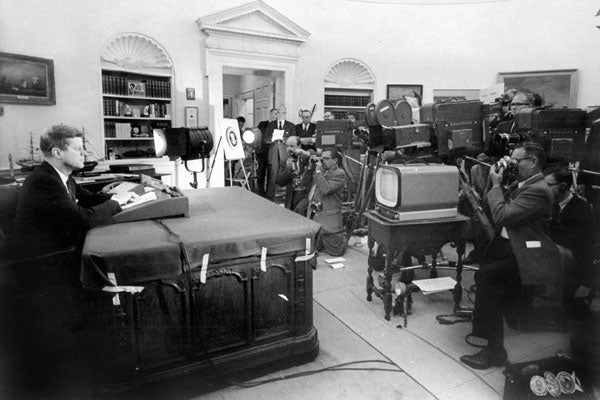It was October 22, 1962. Two weeks before, a little-known British band called the Beatles had released its first single. A week before, the Yankees had beaten the Giants 4-3 in the World Series. It was a normal Monday night in the average American living room.
Until 7:00, that is, when a grim President John F. Kennedy appeared on live television to announce to the nation the presence of bases in Cuba for Soviet offensive—nuclear capable—missiles.
Fifty years later, the story of the 13 days that we call the Cuban Missile Crisis is well known and well told. Now considered one of modern history’s most dangerous episodes, it is also held up as one of the finest moments of Kennedy’s presidency.
Critics have been remarkably muted in this case. JFK’s leadership during these critical days has earned an enduring and unusually bipartisan level of admiration. Historians and strategists discuss his actions as a case study in crisis management, a prime example of strong leadership—under intense pressure—that may have avoided an apocalyptic nuclear war.
Some things have not changed since the early 1960s.
In October 2012, the threats to American security are, if anything, as chilling as they were on that Monday night 50 years ago.
Something that remains constant is the single chair behind the desk in the Oval Office. Regardless of the modern world’s complexity or hostility, our Constitution entrusts just one individual with the task of protecting this country.
Many historians argue that the Cuban Missile Crisis would not have ended peacefully if handled by anyone besides Kennedy.
Would another President have had the audacity to flout the hawkish counsel of older, highly experienced military advisers? Would a different President have possessed the diplomatic acumen to allow Soviet Premier Khrushchev a face-saving option, when the United States, with more attack options than the Soviet Union, was actually in the stronger position?
We can only wonder.
The anniversary of the Cuban Missile Crisis serves as a reminder that moments of national peril are generally unexpected and much more real than is apparent in the American living room.
When such fateful moments arrive, often in the middle of the night, the safety of millions often comes down to the pressured decisions of a single individual.
Unfortunately, there are other Cuban Missile Crisis-like events in our future.
In the hustle and bustle of an election season consumed by economic matters, it is worthwhile— indeed, necessary, that we consider national security issues as well. As JFK himself observed, “Domestic policy can only defeat us; foreign policy can kill us.”
Audrey Beck is currently a member of the Young Leaders Program at The Heritage Foundation. For more information on interning at Heritage, please visit http://www.heritage.org/about/departments/ylp.cfm.
